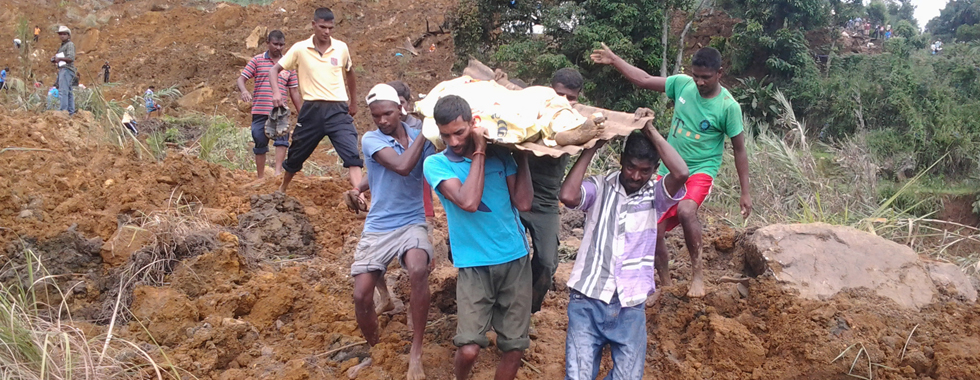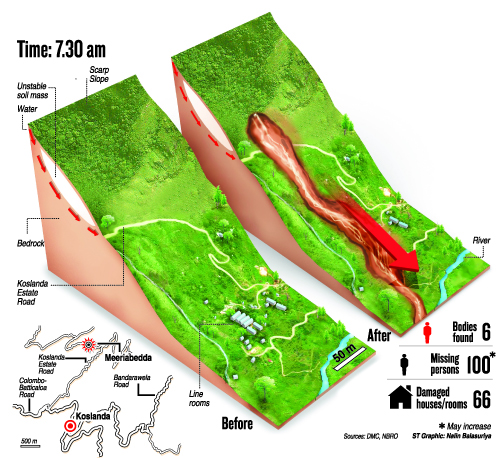News
With a noise like a bomb blast, the mountain smothered the villagers
On the shoulder of a hill on the Meeriyabadda tea estate stood the humble linerooms that were home to 330 men, women and children. Every day, when the children were at school, the parents were out working on the tea plantation.
But that fateful Wednesday morning when the children returned from school their homes had disappeared, and their parents, who had been readying to set out to the plantation fields, were buried deep under the wet red soil as the mountainside collapsed with a roar, earth and rocks hurtling down on the linerooms halfway on the hill and the whole mass of debris cascading down the slope.
As we kept safely to footpaths, earthmovers were being used to dig for survivors.
Security men formed a ring around the area, awaiting the arrival of President Mahinda Rajapaksa.
 “At around 7.15 a.m. we heard a loud noise. It was like a bomb blast,” recalled Maradamuttu Nawaneelan, 28, who lived in one of the two individual houses just below the linerooms with his parents and 15-year-old brother.
“At around 7.15 a.m. we heard a loud noise. It was like a bomb blast,” recalled Maradamuttu Nawaneelan, 28, who lived in one of the two individual houses just below the linerooms with his parents and 15-year-old brother.
“We saw something like smoke at the top of the hill. Some residents climbed up to see what it could be.
“Not even a minute or two after we heard the noise, rocks and soil came tumbling down.
“My family members and I ran towards the road. About 15 other residents rushed out of the line area with us. We couldn’t even hear our own screams over the sound of the landslide – it was terrifying!” Mr. Nawaneelan said.
His family ran a small shop where his neighbours from the linerooms bought their daily needs.
The army and police who are engaged in the rescue efforts had refused Mr. Nawaneelan entry to the disaster zone, so he lingered on the periphery, hoping to be able to salvage at least some of his belongings.
“That afternoon we went back to collect what was left of our house,” he said. “The army did not allow us to go into our house but they promised to help us recover whatever possible. My three-wheeler is under the debris.”
Mr. Nawaneelan’s family had been living there for generations. Although they had several times been asked to move no one had offered them alternative accommodation.
“Six lines on this estate were asked to leave for a safer place but nobody asked us to go anywhere or gave us a place to live in. Some people got land  but we didn’t,” he claimed.
but we didn’t,” he claimed.
The tragedy in Meeriyabadda, Koslanda, where at least 78 persons are still to be accounted for and 75 children orphaned, did not come without warnings.
The most recent landslidealert by the National Building Research Organisation (NBRO) was issued just 24 hours before the disaster occurred, but warnings had been coming for 10 years.
And the warning issued the day prior to the disaster was not effectively communicated to the lineroom residents.
Although a Disaster Management Act, a National Policy and a National Emergency Operation Plan were all developed in the aftermath of the 2004 tsunami, no protocol nor accepted procedure seem to have been followed in acting on warnings issued.
The first warning of a possible disaster at Meeriyabadda was issued in 2005. The NBRO prepared a test report at the request of the then District Secretary, and gave copies to the Maskeliya Plantation Management Company that owns the land under a 99-year lease from the government.
The report highlighted the exact zone that was prone to landslides, said the head of the NBRO’s Landslide Research and Risk Management Division, R.M.S. Bandara.
Subsequent to this report several more NBRO warnings had been given to the authorities, with copies to the plantation company, he said, but all the stakeholders, including the plantation company, District Secretary and the residents, had continued to ignore the landslide warnings.
The Maskeliya Plantation CEO, Sunil Poholiyadde, refused to comment when asked about whether the estate management issued proper warnings and instructions following the warnings issued by the NBRO.
Mr. Bandara maintains that the alert sent by the NBRO had been marked “High Hazard Warning” – a red alert to evacuate residents.
The Assistant Director of the Badulla District Disaster Management Centre rejects this, saying the notice sent by the NBRO was only to be “alert”.
“It did not say ‘evacuate’ at any point, it just said to be alert,” he insisted.
Haldummulla Divisional Secretary Indra Dissanayake also claims that no formal warning for “immediate” evacuation was given and said that upon observing cracks forming in the ground the area Grama Niladari and the Disaster Relief Officer had told the residents to evacuate.
“Our Grama Niladari and the Disaster Relief Officer had spoken to residents. People who got the message were ready to evacuate the next morning. We did not know the seriousness of this,” Ms Dissanayake said, explaining why no more immediate action had been taken.
Ms. Dissanayake claimed people had been instructed to evacuate to a nearby school.
Despite her claims, all schools were functioning as normal on Wednesday, including the two schools attended by the children of the affected community, which have since been converted to a relief camp.
Many residents claim they received no warning while others claim they had been told to evacuate but had not been given an assembly location.
Thambasami Sinniah, 41, who was dug out from under the soil by other residents, claimed the lineroom workers had not received a warning. A father of two, Mr. Sinniah had lived with his parents in the doomed linerooms.
“We heard a loud noise and saw the earth rolling down,” he told the Sunday Times. “Everyone ran out of the house. I ran to help Amma to come out. I was holding her hand when the wall fell over her.
“We had not been given a place to go or asked to evacuate. We would have done so because my line was one of those on top of the hill. If we had been properly notified my mother would be living today,” he said.
Raju Saroja, 57, who lost her husband, grandson, brother and sister-in-law in the landslide, denies they had been told to move out the previous day. A former employee of the estate, she had been living in the linerooms with her daughter and family.
The plantation management company had been slow to act on the warnings of earthslips.
It had provided only 34 houses for the 57 families living in the linerooms.
According to Mr. Poholiyadde, the residents of the linerooms had refused to be shifted to the alternative accommodation.
That claim is rejected by some of the residents.
Maradamuttu Nawaneelan, 28, whose house was damaged, claimed that while the residents had been asked to evacuate the area they had not been offered alternative land or given housing. Others confirmed this.
Disaster Management Minister Mahinda Amaraweera claimed that the residents had been asked to relocate on several occasions but had disregarded the warnings.
“We have no authority to remove anyone from their houses. On an earlier occasion, when we removed people from a landslide-prone site in Nuwara Eliya, they staged a major protest against us afterwards,” he said.
Mr. Amaraweera said that even though the Disaster Management Act gives the government legal provisions to take necessary action, it was difficult to accomplish anything due to the public’s attitude.
“This is not the first time a warning had been issued to this area. People ridicule us, saying we only alarm people all the time. Our officers are not taken seriously,” he said.
Claiming that the main responsibility of welfare of the people living in estates lay with the plantation companies, he stressed that the government received no assistance from the companies which, he said, were reluctant to allocate land to build houses for the people living in vulnerable areas in plantations.
He also claimed that the government would take stern action if plantation companies did not co-operate with the authorities in the future.

